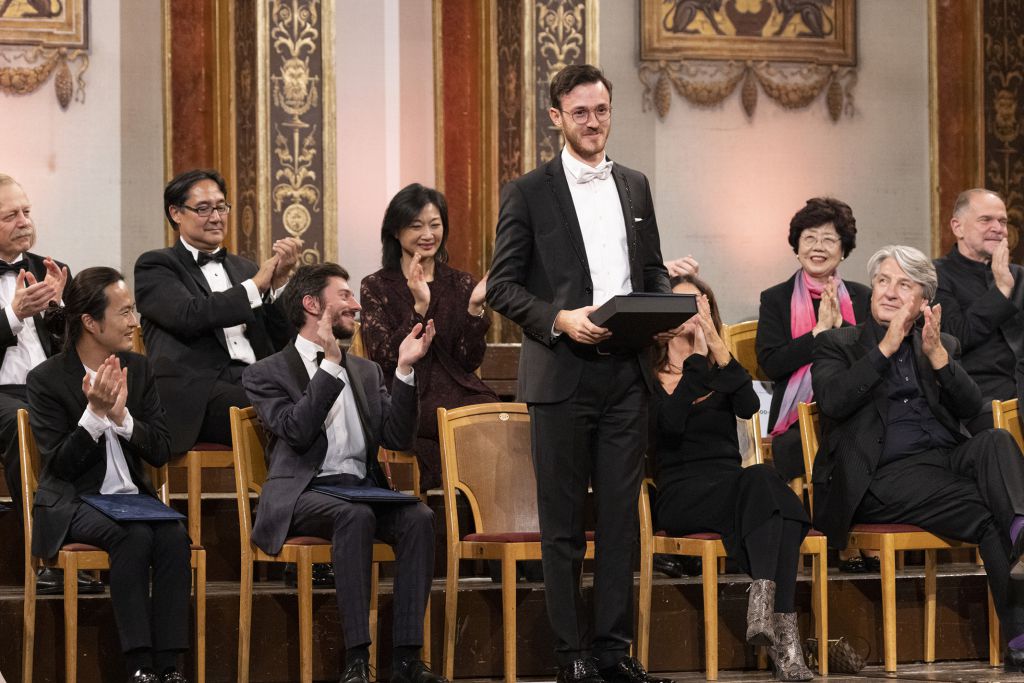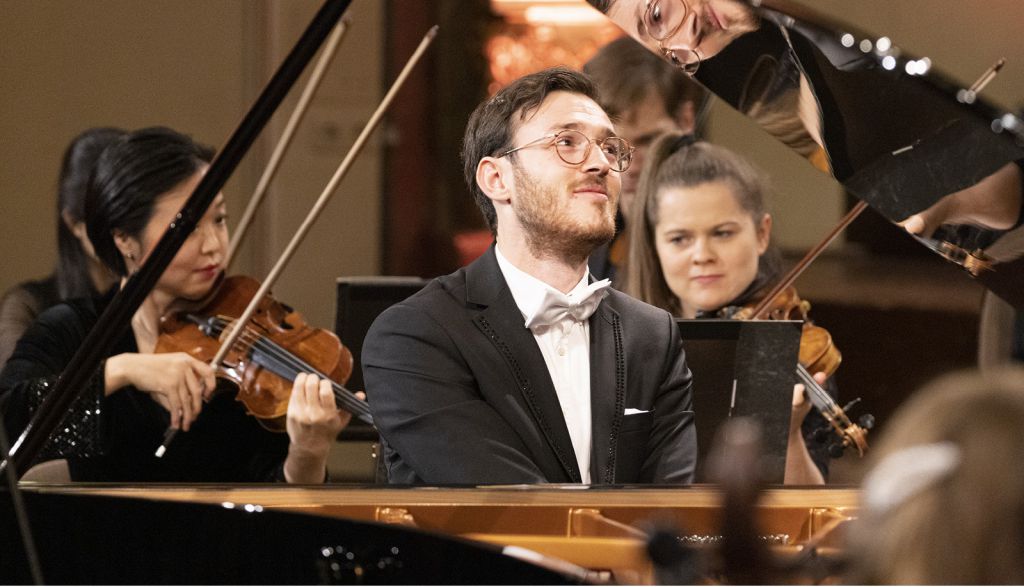A portrait of Aris Alexander Blettenberg, winner of the 2021 International Beethoven Piano Competition
Among Austria’s international piano competitions, the International Beethoven Piano Competition Vienna is the oldest and most important. 2021 saw the mdw hold this competition, which was founded over half a century ago and whose artistic director is now Jan Jiracek von Arnim, for the 16th time.

Last year’s Beethoven Competition saw the 27-year-old German pianist Aris Alexander Blettenberg awarded the first prize. Blettenberg swayed the jury with his performance of Ludwig van Beethoven’s Concerto for Piano and Orchestra No. 1 in C Major op. 15, prevailing over Dasol Kim and Philipp Scheucher at the final round on 21 October 2021 in the Vienna Musikverein’s Golden Hall. Blettenberg received a Bösendorfer concert grand (Model 200) as well as a € 10,000 cash prize donated by the foundation RPR Privatstiftung.
Dasol Kim from South Korea and the Austrian Philipp Scheucher won the second prize ex aequo and received cash prizes worth around € 6,000 each, the one donated by Jasminka Stančul-Cernko and Willibald Cernko and the other by Heinz Medjimorec as the Rita Medjimorec Memorial Prize.
In his interview with mdw Magazine, the competition winner provides intriguing insights into his understanding of music.
On your website, you describe yourself as a pianist, a conductor, and a composer. How did that come about?
Aris Alexander Blettenberg (AB): My enthusiasm for music was sparked by my sister’s desire to learn to play piano. That led my parents to go out and buy one, which I then tried to get sounds out of with no small delight (and more than a little childish over-eagerness). For my parents, the situation couldn’t have been clearer: “This boy needs some lessons!” And that’s how I found my way to the keyboard. For those first few years, though, my interest wasn’t so much in mastering the keyboard and other people’s music then it was in realising my own musical ideas—and for working those out and rendering them more concrete, the piano was a fantastic means to an end. In hindsight, I’d say that my urge to conduct was likewise already there. I can vividly remember how, as a little child, I spent countless hours on the beaches of Greece (my mother’s home country) “conducting” the sounds of the sea and the winds with the kinds of motions you’d use to conduct a symphony. Since the very beginning of my fascination with music, these three “perspectives” have been one and the same thing—namely, means of musical expression—and my constant companions. I identify equally will all three, and I’m most fond of answering the frequent question of, “Well, what are you now?! A pianist, conductor, or a composer?” with a single word: “Musician.”
In the competition’s final round, one noticed how very natural and intense your interaction with the orchestra was. Do these areas of work have a strong influence on each other?
AB: I’ve always have a desire to—or perhaps I’ve always just had to—bring my various interests into harmony with each other so as to ensure that they interact in the best way possible. When I work on a Beethoven piano sonata, I’m helped by the perspectives and experiences I’ve gathered as a composer and a conductor. My own composing, for its part, benefits from insights gained in my life as an active musician. And so on. What’s more, conducting from the piano has been a passion of mine for a number of years now, which might have to do with how I’ve always had a special weakness for chamber music and with how that type of music-making enables precisely this kind of immediate, chamber-like communication with the musicians in the orchestra.

Above and beyond a monetary award, your first prize also included a Bösendorfer concert grand. Have you already been able to find space for your new instrument?
AB: I’m extremely fortunate to have found a place in my chosen hometown of Munich for my rather bulky “family members” Their residence is on the grounds of the retirement home Nymphenburger Bürgerheim, where I can also practice anytime and as much as I want. It happened that this institution’s chapel—an idyllic, freestanding, Bavarian baroque structure—wasn’t being used, and that it had enough space to house this wonderful Bösendorfer instrument. And as if that weren’t enough, it also makes a fantastic little concert hall. So by using this space, I have not only an additional practicing option but also a venue where this wonderful prize can be heard by other people.
How did you experience the competition as a whole, in its new hybrid format?
AB: As it happened, the way in which this competition got stretched out time-wise made it possible for me to be more focused in preparing the programme than I would have been if we’d had the usual dense sequence of rounds. But the flipside of that was how there was this long period where it was unclear whether the competition would be able to go forward at all.
Can you also tell us something about your current projects? What musical and personal goals have you set for yourself? And to what extent is the COVID pandemic having an influence on your activities?
AB: The onset of the pandemic jolted me out of a whole series of engagements, so the initial lockdown phase’s forced deceleration and isolation was actually something of a relief. I used this “gift” of time to take on larger projects that I’d wanted to tackle, projects that I wouldn’t have been able to manage amidst my normal concert career. But I also took time to review my activities and my work so far, to question them—ultimately, I ended up continuing on my way full of new ideas. Back then, we’d all been kind of quietly assuming that things would soon be back to normal. But when those expectations got demolished after a few brief moments of optimism, I began to feel the loss of stage performing and artistic exchange more acutely—and that marked the beginning of a period where I came to realise more urgently than ever before the true value of those lost opportunities and their significance to my life, which I’d previously taken for granted. So it’s all the more consciously that I’m now savouring every event that’s actually able to go forward, and I’m very grateful for this new and lasting awareness. As long as I can retain this gratefulness, I’ll be looking towards the future with an abundance of serenity but also curiosity. In the future, I’d like to get back to doing more with my own musical works. And I’d also like to create more space in my life for Beethoven after having immersed myself so deeply in his output last year. As far as that goes, I’m considering things like practising and performing all of his piano sonatas and chamber works with piano in places where they haven’t yet been performed (or, at least, haven’t yet been performed in their entirety). My general sense is that that especially right now, one’s got to have grand visions and nurture them. In my second homeland of Greece, classical music still has lots to do in terms of audience engagement, and I also see some developmental potential in that respect in my hometown of Mülheim. But regardless of what the near future makes possible or doesn’t, I’m sticking with setting goals that I can fulfil even at a smaller scale—and that will help me look forward with optimism and full of expectation.

